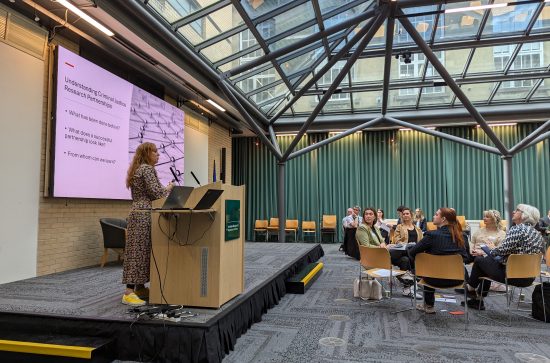
On 11 July, the Department of Justice hosted the Criminal justice Open Research Dialogue (CORD) Partnership’s third workshop of 2024. The workshop brought 50 partners together to build relationships and co-create an agenda for the CORD Partnership’s future. In line with previous workshops, attendees participated in restorative circles, kindly facilitated by colleagues from Childhood Development Initiative, the Irish Prison Service, Maynooth University, Restorative Justice Services and South East Technological University, to build relationships and ensure that everyone had an equal opportunity to speak. Partners also used exercises from the field of design thinking to encourage creativity in their thinking and alignment around specific ideas (with thanks to the Maynooth Innovation Lab for providing materials and support).
To open the day, Ben Ryan (Head of Policy for Criminal Justice, Department of Justice) discussed some of the work that he and his colleagues were doing to develop research for policy capacities and participate in the Civil Service Research Network. Next, Dr. Ian Marder (Assistant Professor in Criminology, Maynooth University) outlined the format of the day, before the groups undertook some relational work.
In the first substantive session, Patrice McCormack (Research Assistant in Open Criminology, Maynooth University) presented the findings of her study, What can the CORD Partnership learn from criminal justice research partnerships internationally? This involved a systematic scoping review of literature relating to the evaluation, development or implementation of criminal justice research partnerships that seek to inform policy or practice. Her findings focused on eight areas: relationships, trust and reciprocity; governance and decision-making; resources and funding; structured communication; embedding partners in each other’s contexts; agreeing on what new research to conduct; making existing evidence easy to use; and developing a learning culture.
The next session involved a panel of frontline practitioners discussing how they thought research could help them in their roles. The speakers included Dr. Sarah Curristan (Inspector, Office of the Inspector of Prisons), Niamh O’Carroll (Probation Officer, Dublin Homelessness Team, Probation Service), Eoghan O’Sullivan (Solicitor and Partner, Powderly Solicitors) and Caoimhe McKeon (Service Coordinator, Crime Victims Helpline). Each person described what it meant to them to practice in an evidence-based way, raising issues that came up in their work, and with which they thought new or existing research could help.
After lunch, a balloon-based energiser and some more relational circles, attendees reviewed the open research priorities the group established previously and used design thinking to turn these into actions. Each group selected a research question or theme and reframed these as problem statements, before using a creative ideation tool to brainstorm ideas on which to vote. The two actions which received the most votes were: 1) to access funding to design, establish and operate a sustainable, state-of-the-art, online, open access and user friendly research repository; and, 2) to organise ‘day-in-the-life’ experiences for academics and practitioners to help them understand each other’s contexts.
The CORD Partnership is funded until December 2024 by the National Open Research Forum. Its aim is to support positive social change by embedding a culture of interdisciplinary open research in criminal justice in Ireland. Partners include: academic researchers from different institutions, disciplines and career stages; criminal justice policymakers, oversight bodies and agencies; community sector services; civil society and advocacy groups; and bodies that make up Ireland’s broader research infrastructure.
CORD previously hosted two workshops in 2024. The first workshop, in January, enabled partners to establish a set of principles, purposes and research priorities for CORD, after which they wrote these up as an open access publication that is currently in press. At the second workshop in May, CORD partners learned about how to organise and operate research partnerships from a number of speakers working in research on policing, big data and early childhood around the world.
To learn more about the CORD Partnership, please contact Dr. Ian Marder on [email protected].
